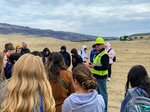

WENATCHEE – The WM team at the Greater Wenatchee Regional Landfill has again been recognized by the Wildlife Habitat Council for voluntarily managing land to support wildlife habitat and natural ecosystems.
Environmental stewardship at the landfill is approached as a long-term commitment. It includes the conservation of shrub-steppe habitat, natural strategies to control invasive species, and nest boxes for American kestrels.
"I'm proud of our team for their dedication to this important work," said Dave Rettell, director for WM's disposal operations for the Pacific Northwest. "We live the WM core values in our day-to-day work, and those core values include the environment. The landscape in the Wenatchee Valley is an extraordinary part of the Pacific Northwest, and we are doing our part to keep it that way."
"We've been operating there (in the Wenatchee Valley) for 30 years and a big part of that work is to make sure that the land and the environment is kept healthy and thriving," WM Communications Manager Patrick McCarthy said.
Central to WM's stewardship work is the nurturing of 80 acres of shrub-steppe habitat, which is native across the Columbia Basin and the natural habitat for greater sage-grouse, sagebrush sparrow and the burrowing owl.
"Some of the initiatives that we've taken on through the projects that have given us this wildlife habitat certification are really focused on the local environment," McCarthy said. "One of them is about controlling Knapweed with natural invasive species control, so we use the Knapweed weevil, which feeds on seed pods to eliminate weeds instead of using herbicides."
"We have water guzzlers for mule deer and birds that are in the area," McCarthy said. "One of my favorite ones is that we have nesting boxes for kestrels, which are a natural deterrent for invasive bird species so the European Starling is controlled with the kestrels."
Providing water for mule deer and birds is particularly important since the landfill is in the rain shadow of the Cascade Range.
"But it's really about keeping the natural environment as protected as we can and our commitment to the Wenatchee Valley is an important thing for us as an organization," he said.
WM, formerly known as Waste Management, began the certification process through the Wildlife Habitat Council in 2010 and has consistently been recognized for their efforts since.
The Council certifies wildlife habitat and conservation education programs in 47 states, the District of Columbia, and 22 countries. Achieving certification requires active conservation programming and educational outreach.
To educate the community, District Manager Eric Keogh uses the landfill property as an outdoor learning lab for local high school students. In 2023, Keogh hosted tours for 500 students.
The landfill is engineered with overlapping environmental protection systems and is subject to highly regulated monitoring and reporting requirements. Systems include engineered liners and covers, leachate collection and removal, and landfill gas collection and control.
The landfill can accept municipal solid waste (household waste), construction and demolition debris, industrial waste, and special waste. The landfill is not permitted to accept hazardous waste.
Quinn Propst: 509-731-3590 or quinn@ward.media.
Comments
No comments on this item Please log in to comment by clicking here